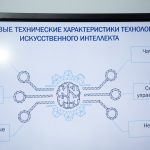17 January 2024
TRAINING ON AI AND IT FOR PROFESSIONAL DEVELOPMENT OF TEACHERS
As part of the cycle of methodological seminars, a training seminar “Education of the future that has already come: a workshop for teachers on the application of ChatGPT and neural networks” was held, organized by the department for the organization of educational and methodological work. The workshop was attended by university teachers and staff who discussed the use of digital technologies to improve the efficiency and quality of university activities. f
The work of the seminar began with the opening speech of the Director of DAPiUOP Yerzhan Domalatov, who urged the participants to make a worthy contribution to the development of our country, participating in innovative projects, constantly improving their knowledge in the field of artificial intelligence.
The seminar discussed topical issues of introducing new artificial intelligence technologies in the educational process. The seminar participants had an opportunity to familiarize themselves with the principles of ChatGPT and neural networks, and discussed practical aspects of applying these technologies in work with students.
The speakers and trainers were Z.G. Kabdrakhmanova, Head of the Department of Computer Modeling and Information Technologies, M.A. Karmenova, PhD, Assistant Professor of the Department of Computer Modeling and Information Technologies, T.V. Panshina, Candidate of Pedagogical Sciences, Professor of the Department of Pedagogical Education and Management. One of the key topics covered at the seminar was the use of ChatGPT as a tool for teaching and communication with students. The participants discussed the possibilities of using ChatGPT-based chatbots to create interactive lessons, conduct testing, and support students outside of school hours.
Practical examples of using neural networks in the educational process were also presented, including the areas of computer vision, natural language processing, and data analysis. Participants were introduced to tools and techniques for integrating these technologies into curricula and programs.
Special attention was paid to ethical aspects of artificial intelligence application in education. The workshop participants discussed the issues of data privacy, security and embodiment of ethical principles in the development and use of educational technologies based on neural networks.
Thus, the workshop provided participants with an opportunity to familiarize themselves with new technologies of artificial intelligence in education, discuss their application and assess the potential benefits and challenges associated with their implementation.
The workshop was interesting and informative. The participants received practical skills that can help them effectively use ChatGPT and neural networks in their teaching practice and comprehensive answers to their questions from the speakers.






